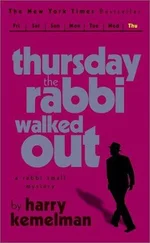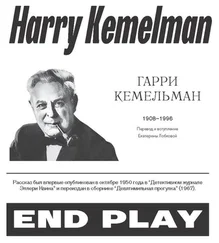"How long does it last, the sermon. I mean?" asked Natalie Wolf. "Why, I never actually timed him." said Annabelle, pleased to be the center of attention, "but I'd say anywhere from twenty minutes to maybe as much as a half-hour."
"Then say we figure on ten minutes." said Flossie Bloom, her eyes glittering at the others, "or even fifteen minutes. What happens next, Annabelle?"
"Next. I guess the cantor sings again and there's another prayer or two and then everybody goes down to the vestry for tea and cake."
"I think it would be better at the very beginning," said Selma. "You're right." said Natalie Wolf, "then it wouldn't look as though it had anything to do with what he was saying at the time."
Annabelle looked from one to the other uncertainly; her friendly little smile frozen on her face. "Were you all planning to go together? It's really quite interesting, and it doesn't last too long. I mean. I don't think you'll be bored." She saw their smiles and wondered if she had said something silly. Of course she knew all these girls, but some of them she didn't know awfully well. Natalie she knew was divorced and there were rumors that she was kind of fast. Of course, if she was a friend of Selma's she must be all right, and Genevieve Fox and Clara Nieman, well, she'd met them, any number of times, but they were really in a different circle altogether. Genevieve drove a white Jaguar, and Clara was single and had a studio apartment downtown right on the water.
"Yes, that was the general idea." said Selma. "We all thought we'd go together in a body. Would you like to come?"
"Oh wonderful! I'd like to. Of course, I'll have to ask Joe, he may have been planning to go tonight, and then of course, I'd really have to go with him."
The Friday evening service began at half-past eight, and it started right on time, the congregants began arriving at eight o'clock, but they remained in the foyer, greeting friends, talking, until a quarter past when they made their way gradually into the sanctuary. Once inside, they took seats and automatically lowered their voices to whispers in keeping with the sanctity of the place. They usually found the rabbi's wife already in her seat in the twelfth row, which was far enough back for her to judge if the rabbi's voice was carrying and on the aisle so she could signal him if it were not, they always nodded to her if they caught her eye and she would smile back and form her lips in" Gut Shabbes." On the bema, next to the ark, the rabbi and the cantor sat together, the latter stately in his black robe, long silken prayer shawl, and high-crowned and be tasseled velvet yarmelke, he sat straight and tall, inclining his head on occasion when the rabbi whispered a comment to him, nodding gravely afterward.
The rabbi, shorter, and seeming even shorter because he tended to slouch in the thronelike chair, cut a sorry figure beside him. In spite of numerous hints from the ritual committee, he refused to wear a black robe, and his prayer shawl, while clean, was of wool and looked yellowish beside the gleaming white of the cantor's. His yarmelke, too, was the ordinary close-fitting skull cap worn by members of the congregation, and since he walked to the temple, his black shoes, plainly visible to the congregation, were invariably dusty, there was a shoe brush in the enrobing room, but in spite of Miriam's adjurations he always forgot to use it.
The attendance varied from week to week, depending largely on the weather. On pleasant nights, about a hundred, they tended to congregate in the middle seats, that is, in the center section, third or fourth row back, after a few minutes of whispered conversation, they would begin leafing through their prayer books as if to get into the proper mood for the service. Those who came in late, or even just before the service began, would take seats in the rear as unobtrusively as possible.
But tonight, just as the rabbi was about to come forward to announce that the cantor would begin the service by chanting the Ma Tovu, How goodly are your tents, O Jacob, half a dozen youngish women appeared at the back of the sanctuary, they glanced about them for a moment and then marched resolutely down the aisle to take up seats in the second row, the rabbi waited for them to get settled, then came forward to make his announcement.
Mrs. Nathanson, like most of the congregation, was annoyed at the interruption and whispered to her husband, "Selma Rosencranz and her crowd. I suppose they're slumming." But before Mr. Nathanson could answer, the cantor, his head thrown back, his prayer book held at arms length, had launched into the chant.
He followed with L'choh Dodi, greeting the Sabbath bride, and the congregation joined in the choruses, then came the responsive reading of a psalm in English, conducted by the rabbi, and then the chanting of the Hashkivenoo, a favorite of the cantor's since his rendition of the chant displayed his vocal range to good advantage, then the congregation pronounced the Shema aloud and then arose to recite the Amidah in silence. During all this, the women in the second row behaved with great propriety, standing when they were supposed to stand, reciting the responses when the occasion required.
The rabbi waited until all had finished the silent prayer and were seated, and then, adjusting his prayer shawl and fingering his skull-cap to make sure it was securely in place, he came forward to the lectem in front of the bema to deliver his sermon, the congregation closed their prayer books and settled back. "In the portion which we shall read tomorrow,” he began, and then stopped.
The women in the second row had risen in a group, shuffled out of their seats, and as boldly as they had entered marched up the aisle and out of the sanctuary. For a moment there was a shocked silence and then muffled voices as people turned to their neighbors. The rabbi waited until the sanctuary door had closed behind the women and then murmured, so that only those in the first few rows could catch the words. "They must have heard it before." Then he began again. "In the portion which we shall read tomorrow..."
* * *
They walked in silence until they turned the corner and the temple was out of sight; then Miriam said. "You handled that rather well. David. You didn't appear to be the least bit angry or disturbed."
"I wasn't, that's rather disturbing, isn't it?"
"What do you mean?" said Miriam. "I don't understand."
"I'm not sure I do, either." said the rabbi. "I should have been angry, the occasion certainly warranted it, but I wasn't. I just didn't care. I don't know why." He paused in his stride and looked at her as though expecting to be challenged. When she remained silent, he went on. "It may be that I’ve always resented this late service, its artificiality, the chanting of iheL'choh Dodi, greeting the Sabbath hours after it's arrived, giving a sermon that's nothing more than a change of pace from prayers, carefully crafted so that it's not too tedious. I resent the fact that we get over a hundred people every week and have difficulty rounding up a minyan for the regular maariv service."
"But that's the way it's always been,” she said at last. "Perhaps so, but I’ve never had a basis of comparison." She looked at him. "You mean because now you've been teaching?"
"That may have something to do with it,” he admitted. "I'm far from satisfied with my class at the college, but at least I feel I'm doing something worthwhile there, here. I'm not so sure, these women,” he turned to her. "do you know them all? I thought I knew some of them, but there were some I'm quite sure I've never seen before."
"It was Selma Rosencranz and her bridge-playing friends." said Miriam tightly. "Oh, I didn't realize they were so interested in religion, they chose a rather dramatic way of expressing their opinion of the Friday evening service, or perhaps of me, since they left the moment I began my sermon."
Читать дальше










